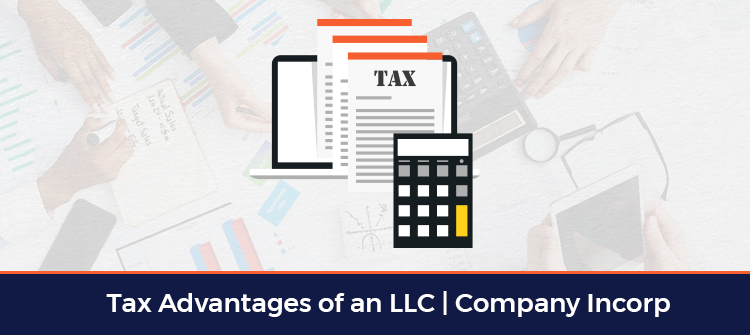Tax Advantages of an LLC | Company Incorp
December 5, 2022 | Company Incorp | No Comments

One of the most popular ways to organize a business is as a limited liability company, otherwise known as an LLC. The primary benefit that LLCs over other types of business entities is the tax advantages. LLCs provide the owners of businesses significantly more tax-free income over sole proprietorships and partnerships as well as other types of business entities. If you have an un proportional business or planning to start one, it’s important to ensure you’ve done your tax planning properly. Talk to an expert in financial planning to guide you navigate the whole process and decide which structure is best for your needs.

Email us anytime!
Email customer service 24/7 at anna@companyincorp.org

Call us anytime!
Reach customer care 24/7 at (617) 545-9902
What Are the Main Tax Advantages of an LLC?
The principle concept behind taxes for LLCs is that the principle of taxation for LLCs is called pass-through. This refers to the manner in which the profits of an LLC can be transferred directly to the owners or the owner without having to pay federal corporate tax first. Partnerships and sole proprietorships have to pay taxes as pass-through entities. They do not pay federal income tax themselves. Instead, the profits of these businesses are directly passed on to the owners of the business, who are taxed according to their personal income tax rates.
Related Resources:
- How to Start a Retail Business: Online vs Brick and Mortar
- These 9 Tips Will Help You Increase your Profit Margins
- Open a Business Checking Account | Company Incorp
This differs from standard C-corporations that are taxed twice. Particularly, the corporation is required to pay tax on its earnings. Any distributions made by its shareholders are taxed as income for an individual. In the end, getting rid of double taxation can make a significant difference over the long haul. This is one of the primary tax advantages of an LLC.
Decide how you want to be taxed
Since the IRS does not provide a tax classification for LLCs, you can make the option of deciding the way you’d like to pay taxes. If you’re the only member of an LLC and you are the sole owner, you may be taxed as the sole owner. Firms that have more than one owner may choose to be taxed as an S-corporation or C-corporation. This decision can be made by filling out IRS Form 8832.
LLC as a Sole Proprietorship
In the event that you’re the sole owner, you are able to create your LLC as the sole owner. This means you must report the company’s loss and profits in your tax returns for yourself, and not pay corporate tax. Form 1040 is filed as a personal tax form as well as the Schedule C business profit or loss form.
LLC as an S Corporation
LLCs are formed to pay taxes since S corporations do not have to pay taxes on their income as a corporation. All owners in an LLC (shareholders) are required to report their portion of the business earnings when they file their own tax returns. It is not a double-taxation issue.
Multi-Owner LLC Partnership
This kind of business structure offers a different way to avoid double taxation. The LLC fills out a Form 1065 return for partnership each owner pays taxes on their share in the profit.
LLC as a C Corporation
If you decide to tax yourself as a C-corporation in this case, you’ll pay tax on two occasions. The corporation files an annual tax return and also pays taxes on earnings. Members of the corporation report their portion of the corporate profits on their personal tax returns as dividends or interest, and then pay tax on the income.
Tax Limits of an LLC
It’s important to keep in mind that forming an LLC doesn’t mean that you don’t have to pay taxes. You’ll still be required to pay tax on the income generated by the LLC at your normal personal tax rate. LLCs, based on the way they are set up might not be required to pay taxes for business initially.
As opposed to the wages paid by an employer, the income earned by LLCs. LLC doesn’t require tax withholding. You’ll also have to pay quarterly tax payments of the estimated federal income tax. Certain taxing authorities in your state could also be involved by taxing LLC earnings directly. However, there are some that charge fees for LLCs.
Tax Considerations for an LLC
In determining how you would like the LLC to be taxed you need to think about all options for you to come up with a shrewd choice. The best tax strategy will differ according to what your most pressing requirement is and how that need will be considered for tax purposes. The most important tax issues to consider when you create an LLC:
- Double Taxation
- Tax Rates
- Capital Expenditures
- Business Expense Deductions
Bottom Line
Limited liability corporations give business owners the flexibility to choose the way their profits from a business are taxed at the federal level. They are also able to set them at a lower cost and without the hassle of a C company, for instance. They also offer owners some protection from lawsuits, as corporations can. If you’re contemplating the best way to structure your company, LLC could be one option to think about.
If you are ready to get start your business, then reach out to one of our amazing team members today at +1-(617) 545-9902 or send a mail to anna@companyincorp.org and let us help you set up your new business.
Corporation, LLC, Tax, Tax Advantages of an LLC

